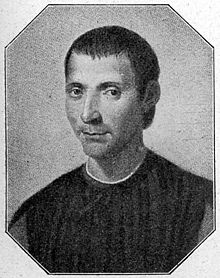Machiavellianism (politics)

Machiavellianism is, according to the Oxford English Dictionary, "the employment of cunning and duplicity in statecraft or in general conduct", deriving from the Italian Renaissance diplomat and writer Niccolò Machiavelli, who wrote Il Principe (The Prince) and other works. "Machiavellian" (and variants) as a word became very popular in the late 16th century in English, though "Machiavellianism" itself is first cited by the OED from 1626. The word has a similar use in modern psychology.
In political thought
Machiavellianism was seen as a foreign virus infecting English politics, originating in Italy, and having already infected France. It was in this context that the St. Bartholomew's Day massacre of 1572 in Paris came to be seen as a product of Machiavellianism, a view greatly influenced by the Huguenot Innocent Gentillet, who published his Discours contre Machievel in 1576, which was printed in ten editions in three languages over the next four years.[1] Gentillet held, quite wrongly according to Sydney Anglo, that Machiavelli's "books [were] held most dear and precious by our Italian and Italionized [sic] courtiers". In France (in the words of his first English translation), and so (in Anglo's paraphrase) "at the root of France's present degradation, which has culminated not only in the St Bartholemew massacre but the glee of its perverted admirers".[2] In fact there is little trace of Machiavelli in French writings before the massacre, and not very much after, until Gentillet's own book, but this concept was seized upon by many contemporaries, and played a crucial part in setting the long-lasting popular concept of Machiavellianism that so infuriates scholars of his actual thought, who assert it is inaccurate and distorted.[3]
The English playwright Christopher Marlowe was an enthusiastic proponent of this view. In The Jew of Malta (1589–90) "Machievel" in person speaks the Prologue, claiming to not be dead, but to have possessed the soul of (the Duke of) Guise, "And, now the Guise is dead, is come from France/ To view this land, and frolic with his friends" (Prologue, lines 3–4)[4] His last play, The Massacre at Paris (1593) takes the massacre, and the following years, as its subject, with the Duke of Guise and Catherine de' Medici both depicted as Machiavellian plotters, bent on evil from the start.
The Anti-Machiavel is an 18th century essay by Frederick the Great, King of Prussia and patron of Voltaire, rebutting The Prince, and Machiavellianism. It was first published in September 1740, a few months after Frederick became king, and is one of many such works.
In psychology
Machiavellianism is also a term that some social and personality psychologists use to describe a person's tendency to deceive and manipulate other people for their personal gain. In the 1960s, Richard Christie and Florence L. Geis developed a test for measuring a person's level of Machiavellianism. This eventually became the MACH-IV test, a twenty-statement personality survey that is now the standard self-assessment tool of Machiavellianism. People scoring above 60 out of 100 on the MACH-IV are considered high Machs; that is, they endorsed statements such as, "Never tell anyone the real reason you did something unless it is useful to do so," (No. 1) but not ones like, "Most people are basically good and kind" (No. 4). People scoring below 60 out of 100 on the MACH-IV are considered low Machs; they tend to believe, "There is no excuse for lying to someone else," (No. 7) and, "Most people who get ahead in the world lead clean, moral lives" (No. 11). Christie, Geis, and Geis's graduate assistant David Berger went on to perform a series of studies that provided experimental verification for the notion of Machiavellianism.
Machiavellianism is one of the three personality traits referred to as the dark triad, along with narcissism and psychopathy. Some psychologists consider Machiavellianism to be essentially a subclinical form of psychopathy,[5] although recent research suggests that while Machiavellianism and psychopathy overlap, they are distinct personality constructs.[6]
Within cognitive science and evolutionary psychology, Machiavellian intelligence is also studied in animals other than humans, for example chimpanzees.
Machiavellianism has been found to be negatively correlated with the Agreeableness (r = -.47) and Conscientiousness (r = -.34) dimensions of the Big Five personality model (NEO-PI-R).[6]
In popular culture
The famous American poet and hip hop artist Tupac Shakur is famous for embracing Machiavellianism personally into his own life. While incarcerated in Clinton Correctional Facility, Shakur read and studied Niccolò Machiavelli and other published works, which inspired his pseudonym "Makaveli" under which he released the record album The Don Killuminati: The 7 Day Theory. He also planned on developing his own record company, Makaveli records, but died in 1996 before development was complete.[7]
See also
References
- ^ Anglo, 283 - see also the whole chapter
- ^ Anglo, 286
- ^ Anglo, Chapters 10 and 11; p. 328 etc.
- ^ Project Gutenberg Jew of Malta text
- ^ Goleman, Daniel (2006). Social Intelligence.
- ^ a b Paulhus, D.L. & Williams, K.M. 2002. "The Dark Triad of personality: Narcissism, Machiavellianism, and psychopathy". Journal of Research in Personality 36 (2002) 556–563
- ^ Tupac Shakur
- Anglo, Sydney. Machiavelli - the First Century: Studies in Enthusiasm, Hostility, and Irrelevance, p. 229, Oxford University Press, 2005, ISBN 0199267766, 9780199267767 Google Books
- Spielberger, Charles D; Butcher, James N. Advances in Personality Assessment, vol. 9. (Hillsdale, NJ): Lawrence Erlbaum Associates, 1992.
External links
- Machiavellianism in The Dictionary of the History of Ideas, online
- Salon Books Machiavelli Personality Test is an interactive version of the MACH-IV test of Machiavellianism.
- Barbara Oakley's Evil Genes page Oakley has written a book Evil Genes, which is mostly about Psychological Machiavellianism
